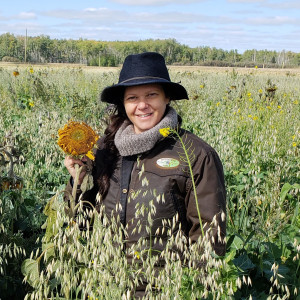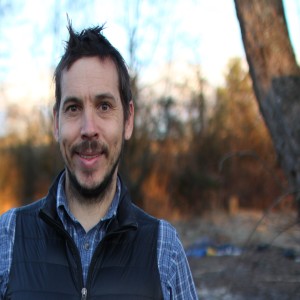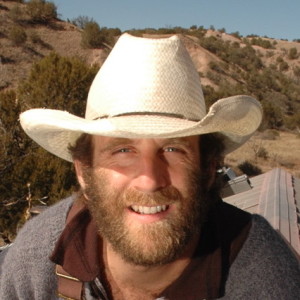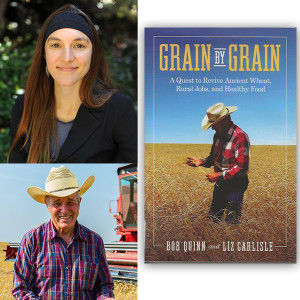AcresUSA: Tractor Time
Authors
Episodes

Thursday Sep 03, 2020
Thursday Sep 03, 2020
With us on our first live episode of Tractor Time is agroecologist Nicole Masters. She has a new book out. It's called, "For the Love of Soil," and there's an excerpt of that book in the August edition of Acres U.S.A. magazine. Go to acresusa.com to subscribe. Nicole has 20 years of experience working in Australia and New Zealand, in North America, to create regenerative food systems.

Friday Jul 31, 2020
Friday Jul 31, 2020
On this episode of the Tractor Time podcast, we're joined by Chris Smith, author of the James Beard Award-winning book, “The Whole Okra: A Seed to Stem Celebration.” Chris lives in Asheville, North Carolina, where he is the founder and executive director of The Utopia Seed Project.
It seems like a perfect time of year to talk about okra. And I have to say that okra is one of my favorite vegetables. I grew it back when I lived in Texas, and it is just a stunningly beautiful plant. It loves the heat. It’s drought tolerant. I loved serving it at dinner parties because people were always surprised it could be so good.
But, let’s face it. Okra is polarizing. There’s the slime, for one. At the grocery store, you find it in a can, which, no thank you.
But beyond all that, it turns out okra is a powerful vehicle for telling stories about genetic diversity, seed to stem eating and even the American slave trade. Chris weaves all that, and much more, into his book.

Saturday Jun 27, 2020
Saturday Jun 27, 2020
Rebecca Burgess is the co-author of the new book Fibershed: Growing a Movement of Farmers, Fashion Activists, and Makers for a New Textile Economy. Her previous book was Harvesting Color: How to Find Plants and Make Natural Dyes.
If you listen to Tractor Time, then you likely care about where your food comes from and how it’s grown. But if you’re like us, clothing doesn’t always get the same consideration. We often talk about farm to table, but not farm to closet.
All of us buy clothing. We buy for comfort, for style, for status, for functionality. We have the brands we stick with. And, yes, sometimes we’ll spend a little extra for a garment made of something we feel virtuous about — an organic cotton t-shirt, maybe, or a pair of hemp slacks. But mainly, we look for things that look good, won’t wear out too quickly and protect us from the elements. But what is this often-opaque global supply chain of fast fashion really doing to our world and to us? What Rebecca describes in this interview and in her book is truly stunning and might just change the way you think about clothing forever.
As you listen to this interview, I suggest you do some laundry, or at least take a look in your closet. Are you as conscientious about your clothing as you are about your food?
In this conversation, Rebecca opens up her closet, somewhat literally, to us, and shines a bright light on a system that takes an enormous toll on our environment. She isn’t just exposing a broken system, however — she has a bold and hopeful vision for what a regenerative clothing system could look like. And it isn’t just about persuading big clothing brands to do the right thing. Her Fibershed movement is well underway, with more than 50 communities already participating.
Rebecca is the executive director of Fibershed. You can find out more about it at fibershed.org. Rebecca is also the chairwoman of the board for the Carbon Cycle Institute and a skilled weaver and maker of natural dyes.

Thursday Aug 15, 2019
Thursday Aug 15, 2019
Doug Fine, an investigative journalist by trade, has emerged as a leading voice in the effort to bring hemp back as a major American crop.
His writing has appeared in places like Washington Post, Wired and Outside Magazine. He’s travelled all over the world, including to places like Burma, Rwanda, Laos, Guatemala and Tajikistan. He’s given TED Talks. He’s appeared on late-night talk shows. And he’s written several books, including Not Really An Alaskan Mountain Man, Farewell My Subaru, which is about his attempt to wean himself off fossil fuel, and Too High To Fail: Cannabis and the New Green Economic Revolution.
His latest book is Hemp Bound: Dispatches From the Front Lines of the Next Agricultural Revolution.
And for Fine, those frontlines are found at Funky Butte Ranch, his 40-acre spread in southern New Mexico where he and his family grow hemp, tend a garden and raise a herd of mischievous goats.
Although Fine sees himself as a journalist first, he doesn’t shy away from speaking up for what he believes in. And what he believes is this: Hemp represents not just the next big money-maker in agriculture. It isn’t just about cashing in on the CBD craze. Instead, he believes it’s an opportunity to change the whole game — and maybe fight off the effects of climate change in the process.
Fine will also be a featured speaker at Acres U.S.A.’s December Eco-Ag Conference & Trade Show in Minneapolis, Minnesota.

Friday Jul 26, 2019
Friday Jul 26, 2019
Hosted by Ben Trollinger / Editor, Acres U.S.A.
Hello and welcome to Tractor Time podcast, brought to you by Acres U.S.A., the Voice of Eco-Agriculture. I’m your host, Ben Trollinger, and as always, I want to say thank you to our sponsors, BCS America.
You’re probably heard of kamut (kah-moot), also known as khorasan wheat, also known as King Tut’s Wheat. It’s drought resistant and highly nutritious. It’s in organic breakfast cereals. It’s in pasta. People with gluten sensitivity can eat it. Artisan bakers drool over it.
It’s one of organic farming’s biggest success stories. It’s a story that’s rooted deep in history and it that might just show us the way forward.
I’m joined by Bob Quinn and Liz Carlisle, co-authors of Grain by Grain: A Quest to Revive Ancient Wheat, Rural Jobs, and Healthy Food.
The book details Quinn’s journey over the last several decades to turn his dryland farm in Big Sandy, Montana into a powerhouse of organic and regenerative agriculture. Through his multi-million dollar heirloom grain company, Kamut International, Quinn has managed to create a durable network of around 200 organic farmers.
Quinn was also instrumental in shaping the country’s first organic food standards back in the late 1990s. Before that, in the 1980s, he helped establish standards for his home state.
Liz Carlisle is a lecturer in the School of Earth, Energy, and Environmental Sciences at Stanford University. Her first book, Lentil Underground, prominently features Bob Quinn’s work and also won the Montana Book Award and the Green Prize for Sustainable Literature. She’s a forager of regenerative agriculture wisdom — and also a recovering country and western singer.
1 hour, 4 minutes